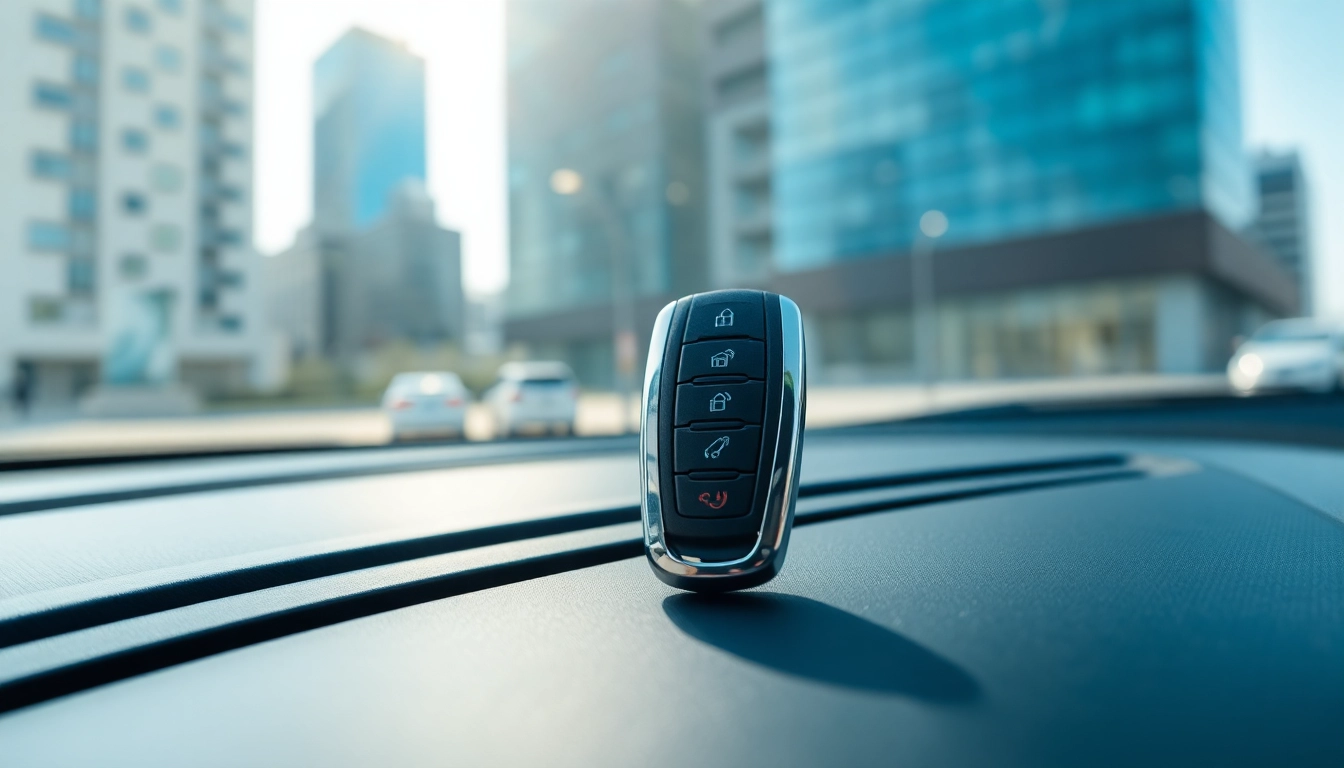Understanding Keyless Carkeys
In the modern automotive landscape, Keyless Carkeys have reshaped how we interact with our vehicles. These ingenious devices eliminate the need for traditional keys by enabling drivers to start, lock, and unlock their cars with just the press of a button or even proximity detection. Understanding the intricacies of keyless technology is crucial for any vehicle owner seeking convenience, security, and modernity in their driving experience.
What are Keyless Carkeys?
Keyless carkeys represent a significant advancement in vehicle security and convenience. Unlike traditional mechanical keys, keyless carkeys use advanced electronic systems to control access to your vehicle. Primarily, these keys come in two formats: the smart key, which allows for passive entry, and the remote key fob, which is utilized for remote access. Smart keys typically feature a wireless transmitter that communicates with the vehicle’s onboard system, granting access as long as the user remains within a predetermined range. Remote key fobs, on the other hand, require active engagement—pressing a button sends a coded signal that unlocks or starts the car.
How Keyless Carkeys Function
At the core of keyless car technology are radio frequency (RF) signals, which facilitate communication between the key and the vehicle. When the driver approaches with the smart key in their pocket or purse, the vehicle’s antenna detects the key’s unique signal as it falls within a specific range—generally between 5 to 20 meters. This interaction allows for automatic unlocking of the doors without the need for a physical key. Furthermore, pressing the start button activates the ignition system when the key is detected inside the vehicle. This technological marvel simplifies the user experience significantly by reducing the chances of key loss or misplacement.
Advantages of Using Keyless Carkeys
The shift to keyless car technology offers numerous advantages, making it a popular choice among modern car owners.
- Convenience: The ability to unlock and start the vehicle without physically handling a key is a remarkable convenience, particularly for drivers juggling multiple tasks.
- Security: Keyless systems often include advanced encryption protocols and rolling codes, making it more difficult for unauthorized individuals to gain access to the vehicle.
- Additional Features: Many keyless systems integrate with smartphone applications, allowing users to control various aspects of the vehicle remotely, such as locking/unlocking doors and monitoring vehicle health.
- Streamlined Experience: Keyless entry systems make getting in and out of the vehicle seamless, especially in situations where hands are full.
Types of Keyless Carkeys
Diving deeper into the world of keyless technology reveals distinct types of carkeys catering to varying owner preferences and vehicle designs. Understanding these types can facilitate decisions regarding car purchases or accessory upgrades.
Smart Key Systems Explained
Smart key systems epitomize the cutting-edge of vehicle access technology. These keys operate on a principle of RFID (Radio Frequency Identification), allowing for passive entry and ignition without the user needing to physically engage the key fob. Keyless ignition means the driver can start the engine with a push of a button, provided the key is within proximity. The convenience of this system is amplified for drivers who prefer an effortless entry without fumbling for their keys. However, the technology requires careful handling, as losing a smart key can lead to costly replacement fees due to its sophisticated circuitry and programming.
Remote Keyless Entry Systems
Remote keyless entry systems utilize a fob to facilitate access and ignition of the vehicle. Unlike smart keys, users must physically press a button on the fob to unlock or lock the doors and activate the ignition. These fobs typically use low-frequency radio signals to interact with the vehicle. Additionally, many remote fobs feature panic buttons that trigger alarms for added security. While they may lack the advanced functionalities of smart keys, remote keyless systems are widely popular due to their reliability and cost-effectiveness.
Comparing Types of Keyless Carkeys
When weighing the pros and cons of the different keyless carkey systems, owners should consider factors including security, convenience, functionality, and cost. Smart keys represent the pinnacle of convenience and advanced technology. Still, they also come with higher replacement costs. Remote key fobs, while simpler and often less expensive, require a bit more engagement from the user. Each vehicle owner must evaluate their specific needs and preferences when selecting the right type of keyless system for their vehicle.
Benefits of Keyless Carkeys
The transition to keyless carkeys has brought about transformative benefits for vehicle owners, enhancing their overall experience and peace of mind.
Convenience and Accessibility
One of the primary draws of adopting keyless carkeys lies in their unmatched convenience. For instance, drivers can unlock or start their cars just by being in proximity to the vehicle, greatly expediting the process of entering and using the car. This ease of access is particularly beneficial in adverse weather conditions, where fumbling for a physical key can be cumbersome. Moreover, this accessibility extends to multiple users, wherein family members can have access to the vehicle without the need for multiple physical keys.
Enhanced Security Features
Keyless carkeys offer enhanced security compared to traditional keys. Many modern keyless systems implement high-level encryption and rolling codes that make unauthorized duplication extremely difficult. Some systems even incorporate immobilizers that shut down the engine if a correct signal is not detected, thwarting potential thieves. Additionally, many vehicles equipped with keyless entry also come with built-in alarms and notifications that alert the owner of any unauthorized access attempts, further fortifying the vehicle’s security protocol.
Replacement and Emergency Options
Despite the sophistication of keyless technology, there are scenarios where keyless carkeys may need replacement or emergency access. Most keyless systems come with backup mechanical keys that can be utilized in emergencies if the fob’s battery dies or if the electronic system fails. Understanding these options can save vehicle owners significant time and hassle. Additionally, professional locksmith services specializing in keyless systems can often provide replacements or repairs at a fraction of the cost charged by dealerships.
Common Issues with Keyless Carkeys
While keyless carkeys provide numerous benefits, they’re not without potential issues. Recognizing these challenges can empower owners to take proactive measures, ensuring a smoother experience.
Technical Problems and Solutions
Common technical problems include malfunctioning fobs, battery depletion, and signal interference. For instance, if a fob is not functioning correctly, it may require battery replacement or reprogramming. Additionally, environmental factors such as nearby radio interference can occasionally disrupt the signals between the key fob and the vehicle. Owners can overcome these problems by ensuring their key fob is well-maintained, replacing batteries promptly, and avoiding keeping the fob too near other electronic devices that can interfere with its signals.
When to Replace Your Keyless Carkeys
Deciding when to replace keyless carkeys can be pivotal. Signs indicating replacement may include fading remote button responses, erratic locking/unlocking behavior, or failure to start the vehicle. If the fob is becoming increasingly unreliable, it may be more cost-effective and secure to replace it rather than continue to troubleshoot. Being proactive in addressing these signs can help prevent being locked out of your vehicle unexpectedly.
Maintaining Your Keyless Carkeys
Proper maintenance of keyless carkeys can extend their lifespan significantly. Recommended practices include keeping the fob clean, avoiding exposure to extreme heat and direct sunlight, and ensuring stored batteries are fresh and relevant. Regular checks can mitigate many potential issues before they escalate into expensive repairs or replacements.
Future of Keyless Carkeys Technology
The future of keyless carkey technology is poised for exciting developments as automotive innovation continues at an incredible pace. Keeping abreast of emerging trends can inform owners about the potential enhancements in their driving experience.
Trends in Car Key Technology
As the automotive industry increasingly embraces smart technology, trends such as biometric authentication, which utilizes fingerprints or facial recognition, are beginning to emerge. Vehicles may soon integrate these security features, providing even greater assurance against unauthorized access. Additionally, as vehicles themselves become more connected through networks and the Internet of Things (IoT), keyless technology will likely evolve to include more cohesive integrations with driving assistance systems and other smart features.
Impact of Smart Technology on Keyless Carkeys
Emerging smart technologies are anticipated to further enhance the capabilities of keyless systems. For example, software upgrades could potentially enhance communication protocols and improve compatibility with mobile devices. Smart technology may also allow vehicle owners to monitor their vehicle’s status in real-time from a smartphone, receiving alerts about battery life, unlock attempts, and other relevant notifications.
Integrating Keyless Carkeys with Mobile Apps
The integration of keyless carkeys with mobile applications presents a whole new layer of convenience and control for vehicle owners. Apps can facilitate remote locking/unlocking, engine starting, and access to vehicle diagnostics, making vehicle management more accessible than ever. Given the rapid pace of technological advancements, future developments might even allow seamless integration with other smart devices, further enhancing the user experience.



